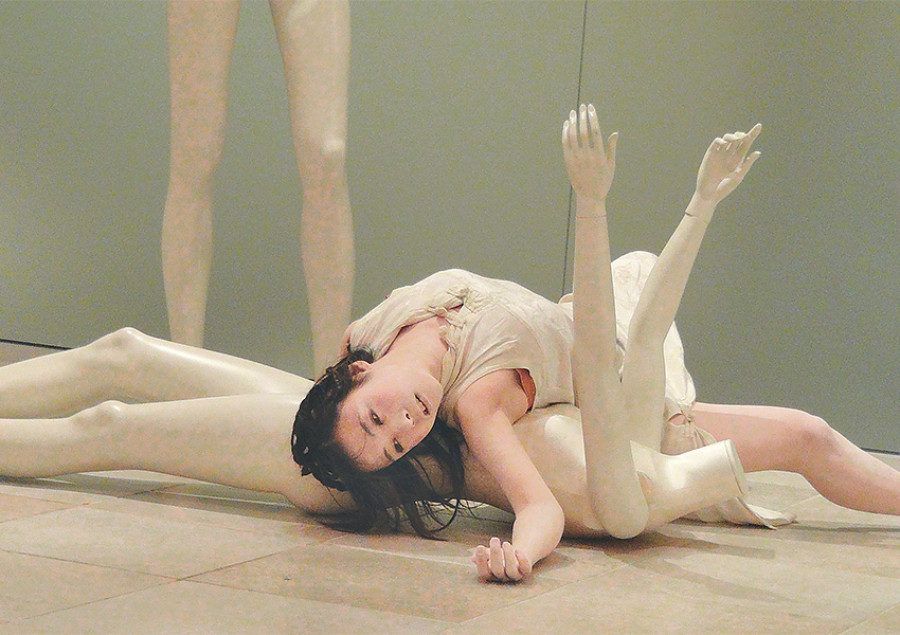Fiction Park
Plath is the name of the new one
A man seeking freedom from cigarettes realises that his struggle is for a larger idea
Chiran Raj Pandey
It is very easy to smoke cigarettes. It is also very easy to not smoke cigarettes, if you don’t already smoke cigarettes. It is slightly less easy to not smoke cigarettes if you already smoke cigarettes, and this works both ways. But the most difficult thing to do is to smoke just one cigarette every day.
I seem to have embarked on one of the most difficult journeys of my life.
But what to replace 9 out of 10 cigarettes with, then, if I were to smoke only one cigarette every day? Especially with Suryas, oh the struggle with a Surya. You can never get enough of the sun…Unless you’re suicidal, that is. You just let go of the sun and it’s very easy to not get up the next morning. Because the sun symbolises the morning, you have to hate it. If you don’t look at the first shred of light that falls on you while you sleep, it means the bed you are sleeping on is your deathbed and you are suicidal.
I am not suicidal, my friends. I just want to smoke one cigarette every day.
And so the struggle, again, is what to replace all those cigarettes with. I’ve thought about it, I’ve thought about it for a very long time. I have tried reading my way through 9 cigarettes until the one, but what to read, really? I have tried prose but prose is too cigarette. There is a very particular quality in the writing that I read—and this is probably the same writing you read, probably—that disallows you to understand prosaic rhythm until it syncs with the cccrackles and the tchssssss. Surya, my friends.
Which means reading doesn’t work. And reading will never work, because things that never work once will not work twice. This should be a lesson in life, if there are things like lessons in life. Bye-bye reading prose and hellow drinking. What kind of argument is that, anyways?
I’ve let go of that idea as quickly as you have been to condemn it. Although, there is a difference, my friends. Letting go is not characterised by condemnation. It is characterised by pity for the self, and that is never the best kind of pity. Pity for the self comes with years and years of doing what I’m not even sure. Self-pity comes from the soul, and you haven’t ever seen the soul before. What do we do with things we’ve never seen before?
We say, “No, no, no. I will not see her anymore.” And perhaps or perhaps not, but this is the same as the fundamental conflict of meaning. Life will mean nothing to you until this meaning glares at you from the depths of darkness, and I mean the dangerous premise. Depth comes with the darkness, and darkness comes with death. You and I may have tried our hands at death several times, but it is an even more dangerous premise to look for easy death. Dying has to be difficult. The suffering is what must be noted, and keeping note of the suffering is very difficult, my friends, because it takes many forms. There is suffering in understanding what your mother wants for your father, and what your father wants for you, and there is even more suffering in knowing that none of these are things that are ever going to thing. There is suffering in knowing that the only way you can tell your mother to do away with your father and your father to do away with you—and I don’t mean killings, my friends, because dying is for the self—is by telling yourself, again and again, that the next time you step into the air that surrounds mother-father is going to be the last. There is suffering in understanding that love is for the people who like drowning and lack the skills of swimming and that the last time I tried to drown someone in love, the skills lacked with the one who was being loved, not the one who was loving. And so that is that and I have never seen her again, because, my friends, dying is for the self. The void is for the self, and the void is something you have never seen before, much like the soul. But the people who are left behind, the people the self betrays, are never allowed near the void. This means that where the self goes, no one else goes and, although the self is alleviated, no one else is.
And so the next replacement for the 9 out of 10 cigarettes is exercise. My friends, where “friends” is a very large group and father belongs to it, have always told me that exercise helps with endurance. A sound mind-body connection. It keeps your psyche in touch with your physique, and that has always been most important. Exercise helps with discipline. It helps you overcome overwhelming stress. But then again, the problem with exercise is that the effects are slow, slow, slow. I cannot wait for a year or even half a year, because remember I said I am not suicidal, my friends—am not, but not will be.
I need the immediate, grasp the quickest, fast, fast, fast. Let me tell you that the last time I waited for a year or even half a year, close to her, closer, closer, and suddenly, there was no longer anything—anyone—to be close to. I cannot possibly want that, I cannot possibly have that happen again, my friends. There is only so much a man can take before he has to let go of himself.
This brings me back to self-pity and it is only for the self, my friends. And maybe that is the problem, I have thought. Maybe it has been the self for too long, but then again, too long is shorter than too longer. Maybe it is time that the self be done away with, and the other be the priority. Once upon a time in the city where I live, there was a girl who loved poetry as much as she loved me. Even then, the self was larger than the other, but she was my own. And one day, I thought I had let her go, but before long I found out that she let go of her self. I loved her so much for too long until I realised that always, always, too long is shorter than too longer.
And now, maybe, the catharsis is in the poetry. The same poetry that drove her to sinking will be my upheaving, then. I will scream her name many times until her name stops meaning as much, the same way meaning leaves words when they are repeated repeatedly. The struggle of replacing 9 out of 10 cigarettes until that one is an unimportant struggle, my friends. I will not care for it as long as I have cared for the self, because as it turns out, caring for the self does not actually do much good to the self.
And so, for now at least, the same poetry that persuaded her to let go of, in self-pity—and that is the dangerous one, my friends—will replace cigarettes.
And maybe, just maybe, Plath is the name of the new one.




 8.12°C Kathmandu
8.12°C Kathmandu












